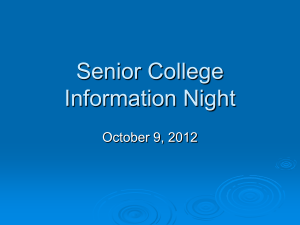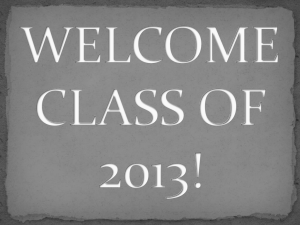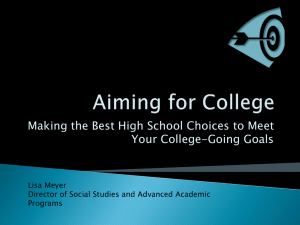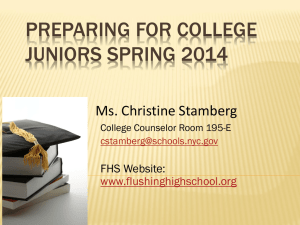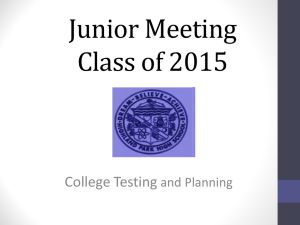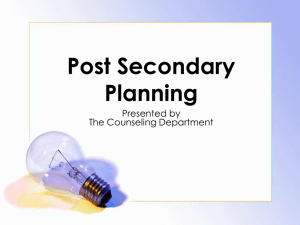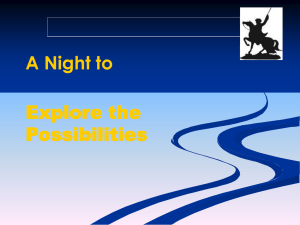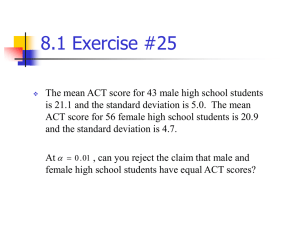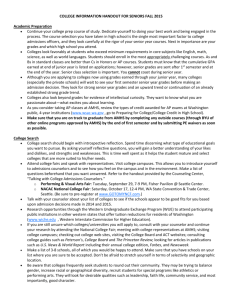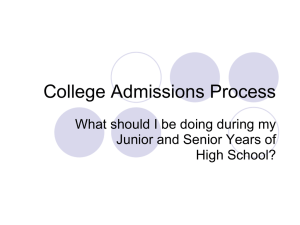Junior College Planning Night PowerPoint Presentation
advertisement
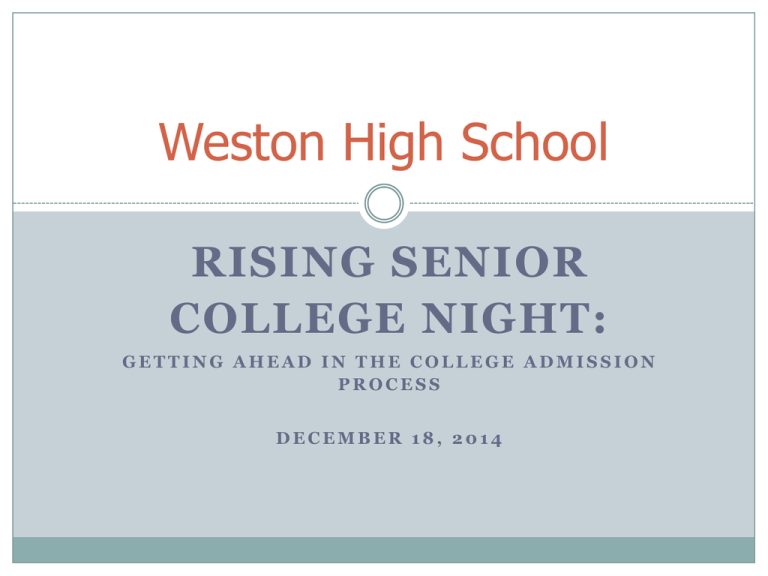
Weston High School RISING SENIOR COLLEGE NIGHT: GETTING AHEAD IN THE COLLEGE ADMISSION PROCESS DECEMBER 18, 2014 Tonight’s Focus Application Process Timeline: What should I be doing now through the end of summer? Researching Colleges Standardized Testing Components of the College Application WHS Application Process What Should I Be Doing Now ? Timeline February - June Schedule Individual Junior Planning Meeting with your counselor (Starting in March) Keep Assigned Appointment in CCC Register / Prepare for AP exams Register / Prepare for SAT, Subject Tests and ACT Schedule College Visits A Good Decision Requires Information Gather information about yourself strengths, weaknesses, abilities, interests Gather information about colleges Admission statistics Location Size Majors/ Programs Financial Aid Retention & Graduation Rate What Resources Are Available? Naviance College Guidebooks Campus Visits Visits at WHS College and Career Center WHS Counseling Newsletter College and Career Center Marilyn Moks CCC Prospective College List Add Colleges to Prospective List Video Clip How should you choose colleges to apply to? Stephanie Balmer, Dean of Admissions Dickinson College Standardized Testing SAT SAT II: Subject Tests ACT All students should set a goal to have all of their standardized testing completed by the end of the school year. Fact or Myth #1 My test score is the most important factor in a college's admission decision. #1: Myth Admission test scores are just one factor colleges consider, along with grades and classes. While most fouryear colleges require tests, the emphasis on the test scores varies by college. Fact or Myth: #2 I don't need to take an expensive testprep course to prepare for an admission test. #2: Fact Free and low-cost preparation works as well as, and maybe even better than, expensive test prep. Try these ideas: •Use practice tests on the test maker's website. •Take the PSAT/NMSQT or PLAN. These tests cover the same subjects as the SAT and ACT. •Make it a habit to read and write frequently in and outside of class. Fact or Myth: #3 I need to take an admission test multiple times to get the best possible score. #3: Myth Studies show that taking tests multiple times won't significantly improve your score. But if you feel you didn't do your best, you have the option of learning from your score and taking the test a second time. Taking it spring of junior year gives you that flexibility and can help you start on your college list and visits. Fact or Myth: #4 If I get a really high score on an admission test, I can get in anywhere. #4: Myth High test scores won't automatically get you in any college. For example, you may have high scores, but your school record shows that you haven't worked hard in your classes. Colleges want well-rounded students who have shown good character, motivation and accomplishments, both inside and outside the classroom. Fact or Myth: #5 I can choose which colleges see my scores, and I can choose which scores to send. #5: Fact Both the SAT and the ACT allow you to send scores to colleges you choose. And if you've taken either of these tests more than once, in many cases, you can choose to share only your best scores. Visit a college's official website to check its score-use policy, or use College Search to find colleges' SAT score-use policies. Remaining SAT and Subject Test Dates Test Date Test Offered Registration Deadline Late Fee January 24th SAT & Subject Tests Dec 29th Jan 13th March 14th SAT Only Feb 13th March 3rd May 2th SAT & Subject Tests April 6th April 21st June 6st SAT & Subject Tests May 8th May 27th It is the student’s responsibility to know which tests are required by each college Remaining ACT Dates Test Date Registration Deadline Late Fee February 7th January 9th Jan 10th April 18th March 13th March 14th June 13th May 8th May 9th Resume – Things to Include • STUDENT GOVERNMENT • PERFORMING ARTS ACTIVITIES • YEARBOOK • SPORTS: Varsity and any out-of-school clubs or experiences • COMMUNITY SERVICE • OUTSIDE of SCHOOL LEARNING EXPERIENCES • OTHER ACTIVITES (i.e. religious activities, hobbies, clubs, etc.) • SUMMER or SPECIAL TRAVEL EXPERIENCES • EMPLOYMENT • HONORS and AWARDS Video Clip Is participating in a lot of activities important? Stephanie Balmer, Dean of Admissions Dickinson College Timeline . . . continued May/June Return all necessary processing forms to Mrs. Osinski in Guidance Parent Brag Sheet – submit online through Naviance Resume– submit online through Naviance Transcript Release - Tan Junior Questionnaire – submit online through Naviance Begin Journaling Essay Ideas Continue to Research and Visit Colleges Ask 2 teachers to write a letter of recommendation for you in the fall Teacher Recommendations Two Teacher Recommendations Ask your teachers, in person, prior to leaving in June. Follow-up, Thank you notes Getting Started on the Essay Brainstorm essay ideas with parents, teachers and friends. Read the six essay prompt on the Common Application. www.commonapp.org (*new prompts will be released in March) Think of an interesting story to tell that answers one of the prompt and reveals something about you not already shared in your application. Work on your story over the summer. Good essays evolve and take many edits. Check supplemental writing questions for each individual college – do not short change these! Video Clip How should you present yourself in an essay? Jeff Brenzel, Dean of Undergraduate Admissions Yale University WHS College Application Process • Expectations • When to Apply • How to Apply • Components of the Application Expectations WHS uses Naviance exclusively to manage the College Application Process. Students are expected to: Update Prospective & Active Applications Complete all processing forms Students - Check Weston email daily and respond. When to Apply • Early Action • Restrictive Early Action • Early Decision I & II • Priority • Regular Decision • Rolling Admission How to Apply Apply Online Use the Common Application (www.commonapp.org) whenever possible. Check if supplement is required. Components of the Student Application Student and Demographic Data Academic Information Extracurricular Activities Essay(s) Signature – electronically Payment (if required) Sending SAT and ACT Score Students must contact the testing agency to request scores to be sent to each college. WHS does not report SAT or ACT scores on the transcript. SAT - www.collegeboard.org ACT – www.ACT.org What Will the Counselor Send? Transcript School Profile Secondary School Report Form Counselor Recommendation Teacher Recommendations Completed Application Application submitted online by student SAT or ACT scores requested, by student, to be sent from testing agency School package sent from College Guidance Office which includes: Teacher recommendation letter(s) Counselor Recommendation School Report Form Transcript School Profile Follow-Up Follow-up with each school to be sure everything has arrived and your application is complete. Timeline . . . continued Over the Summer… Continue Make all necessary revisions to your main essay Register Begin Fine to research and visit colleges on the commonapp website filling out college applications tune the list of schools you will be applying to in the Fall. Lastly……. • Keep the process in perspective • Work together as a family • Students must take ownership • Discuss finances openly • Start early and meet all deadlines Video Clip Experts debunk the top college search myths.

